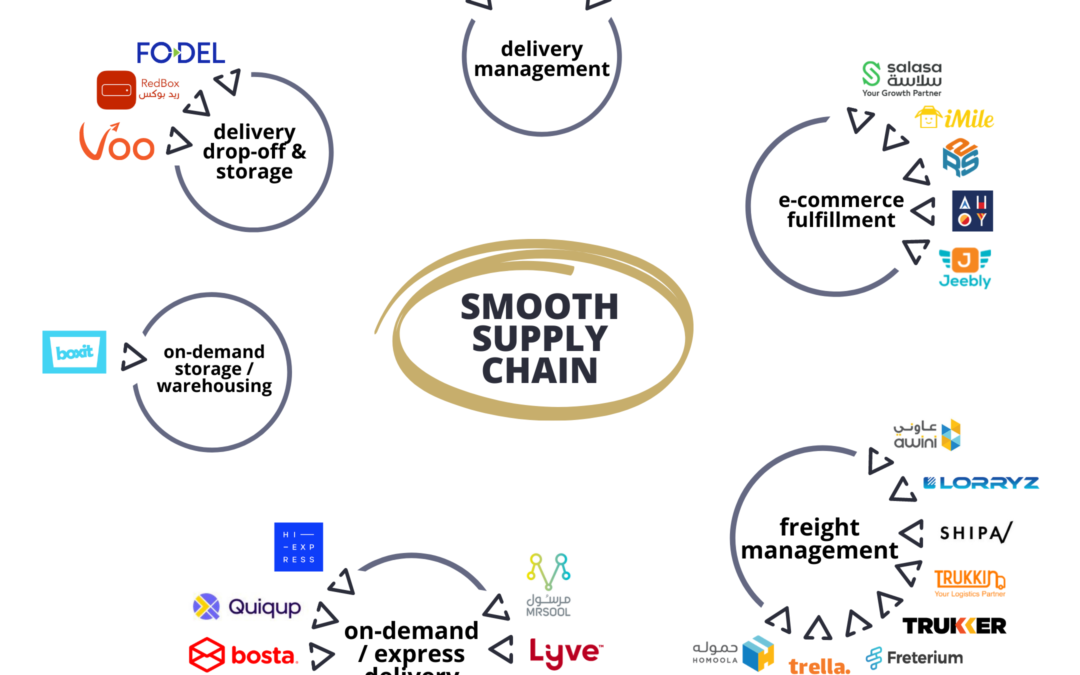
What’s your fav marketplace?
The next stop of our Seed_2021 program is Egypt. Book your pitch slot here.
By the way,
Have you heard of the HR wizards who will build your HR department? WizHRD works with tech startups and SMEs. How about hiring a dedicated HR manager starting $299/month?✨
AVC MENA Marketplace 2021 Collection
Groceries, food & bev, general retail, services…
In 2020, direct-to-consumer (DTC) e-commerce growth reached 500% for some regional players.
Buyers have developed new habits. They became more digital-savvy. 8% of GCC households bought goods online (up from 2%), however the figure for developed markets (like US, China or Germany) is around 25%. The online retail boom in the GCC (and MENA) is only at its beginning.
Buyers also like to shop regionally. Cross-border shopping now accounts for two-thirds of all sales. Kearney forecasts the GCC e-commerce sector growth at 20% this year, while reaching a value of $50 billion by 2025. Very possible at this pace.
We present you AVC MENA Marketplace 2021 Collection.
200 MENA marketplaces. 12 categories. 12 countries.

Geo reach: Bahrain, Egypt, Jordan, Kuwait, Lebanon, Morocco, Oman, Palestine, Qatar, Saudi Arabia, Tunisia and UAE
More than a third of the reviewed startups is present in the UAE market (71), followed by Saudi Arabia (39), Egypt (34), Kuwait (17) and Jordan (12).
Markets that we see having a significant room for growth are Lebanon, Jordan, Qatar and Bahrain.
Though Groceries and Food & Bev fall under Retail, we decided to present each separately.
Fashion retail is set to grow 18% on a yearly basis. We reviewed 33 retail marketplace startups that include not only fashion (Noon, Maison du Maillot, Boutiqaat) but also baby products (Mumzworld, Baby Souk), toys (Yallatoys), pre-owned items (Cartlow, Melltoo), (Floranow, Floward), cars (CarSwitch, Seez), automotive spare parts (Odiggo, Speero), artisan produce (Sharqi Shop)…
Services is a broad term and, in our collection, it covers areas such as home services (Ajeer, Rizek), car services (Carcility, Srvme), parking (Yalla Parking), pet care (Vetwork), cleaning & laundry (JustClean, Justmop, Washmen), HR (Ogram, Passioneurs, Ureed), marketing (Keepface) and web design (Lvendr).

There are only 17 B2B marketplaces in our collection. We @ArzanVC see a huge potential in this segment. Hence our investment in Retailo. It’s a nascent sector
Globally, B2B e-commerce is expected to grow 70% by 2027. By 2025, majority of B2B transactions will happen online (80%).
And apart from B2B, there are other untapped areas: art, legal counseling, pet care, sports…

|
TL;DR (too long; didn’t read)
Arzan VC's MENA Marketplace 2021 Collection presents 200 marketplaces in 12 countries of the Middle East. We split them into 12 categories. Groceries, food & beverages, general retail and services are the leading marketplace sectors. We see a great space for growth in B2B e-commerce, which is expected to grow 70% by 2027.
|
What’s for dinner tonight?
iKcon was named “Cloud Kitchen Business of the Year” by Entrepreneur Middle East.
The rainmaker
Cartlow was recognized as one of the movers and shakers powering the growth of the UAE’s startup ecosystem by Gulf Business.

100 astronauts
POSRocket started with 5 astronauts in 2016 and now it is a family of 100!

1.4 million pieces of jewelry
Mejuri soared past 1.4 million jewelry pieces sold and it launched a higher-value, more luxurious collection.
About your Instagram
CrowdAnalyzer published the State of Social Media 2021 report about social media penetration, popular influencers and analytics of popular posts and behavior based on sectors across Bahrain, Egypt, KSA, Kuwait and UAE.
+1 marketplace
Zid launched an app marketplace that will allow merchants on Zid’s platform to access solutions and services built by third-party developers.
Latest Jobs @ArzanVC Family
-
Senior Software Engineer (Ruby on Rails) atQoyod (Cairo)
-
Graphic Designer at Citron (Dubai)
-
Photographer at Citron (Dubai)
-
Business Development Specialist at Armada (Saudi Arabia)
-
Product Manager atArmada ((Tunisia / Kuwait / Bahrain)
-
Senior Full Stack Developer at Armada (Tunisia)
So, what are your most fav marketplaces?
Hasan
![]()
![]()
![]()
![]()
![]()
![]() Received this from a kind friend? You can subscribe to our newsletter too.
Received this from a kind friend? You can subscribe to our newsletter too.
Copyright © 2021 ArzanVC, All rights reserved.
Want to change how you receive these emails?
You can update your preferences or unsubscribe from this list


























